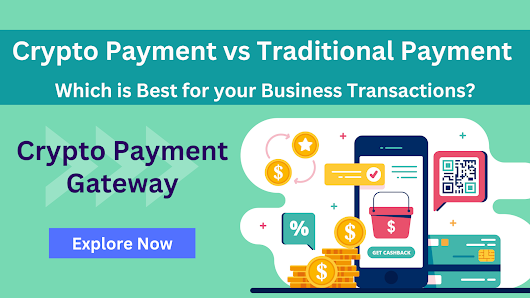Crypto payment vs traditional payment: Which is best for your business transactions?
Cryptocurrency, also called digital or virtual currency, has demonstrated enhanced security and quicker transactions compared to conventional payment methods. The utilization of blockchain technology in cryptocurrency provides lower transaction fees and cost-effective operations, which are crucial factors for businesses contemplating a crypto payment gateway.
With the increasing acceptance of cryptocurrency in business transactions, companies are actively investigating the advantages of incorporating a crypto payment gateway while also assessing potential risks such as market fluctuations and regulatory hurdles.
What is Crypto Payment Gateway?
A crypto payment gateway is a service that enables merchants to accept payments in cryptocurrencies like Bitcoin, Ethereum, and other digital currencies. It helps integrate cryptocurrency payments smoothly into online stores or websites, allowing customers to pay for goods and services with their chosen cryptocurrencies. The gateway securely processes transactions and converts cryptocurrency payments into fiat currency for merchants, offering a convenient and effective way to conduct transactions in the digital economy.
The payment is instantly converted into the merchant's preferred fiat currency. The converted amount is then deposited into the merchant's account.
Simplifying Crypto Payments for Merchants:
Through simplifying the complexities linked with cryptocurrency transactions, these gateways present a simpler method for businesses to accept digital currencies in addition to conventional payment methods. They ensure immediate settlement of transactions, lessening the risk of volatility by securing the market rate during the transaction.
Why Crypto Payment is Better than Traditional methods?
Lower Transaction Costs: Crypto payments typically have fees as low as 1%, which is significantly less than the 2-3% charged by credit card companies.
Speed and Efficiency: Cryptocurrency transactions are processed within minutes, enabling quick business operations without the delays seen in traditional banking.
Enhanced Security: Crypto transactions do not allow for chargebacks, providing businesses with increased financial security. Additionally, cryptocurrency operates on a decentralized system, independent of government or financial institution control, with encrypted transactions stored across multiple nodes, making them highly secure and tamper-resistant.
Privacy and Accessibility: Cryptocurrencies enable anonymous transactions, unlike traditional methods that require personal information disclosure. Moreover, anyone with internet access can use cryptocurrencies, providing financial services to the unbanked without centralized authority.
These characteristics highlight the efficiency, cost-effectiveness, and security that crypto payment gateways offer, making them a better option for modern business transactions.
Features of Crypto Payment Gateway:
Acceptance of multiple cryptocurrencies:
Direct payment from the payer's cryptocurrency wallet to the merchant's account. Immediate conversion of crypto payments to fiat currency, with transaction settlement in fiat to reduce volatility risks.
Integration and Usability:
Plugins and integrations are available to ensure compatibility with e-commerce systems. The interfaces are user-friendly for merchants and customers, making transaction management and viewing easy.
Steps for Implementing a Crypto Payment Gateway in Your Business
1. Selection: Opt for a gateway with the required technology and compliance measures.
2. Onboarding: Complete verification, a process that may require a few weeks.
3. Integration: Use provided tools (plugins, APIs) for website integration.
4. Physical Devices: Integrate with POS systems for in-store payments.
5. Cryptocurrency Selection: Highlight popular or high-converting cryptocurrencies prominently.
Customer Experience:
During customer transactions, the process includes choosing a cryptocurrency, checking the exchange rate, and sending the payment to the merchant's wallet. The transaction is subsequently verified and confirmed on the blockchain network, with the gateway provider informing both parties once the payment is successful. Based on the merchant's choice, the payment can be accepted in cryptocurrency or converted to fiat currency, with certain gateways providing immediate conversion.
Conclusion:
Crypto Payment Gateway offers clear advantages over traditional methods, with lower fees, improved security, and global accessibility. They streamline digital transactions, expand market reach, and enhance financial security. By selecting the right gateway, businesses can leverage these benefits for competitive advantage. Despite challenges like market volatility, integrating a crypto payment gateway can meet modern consumer demands and drive future payment innovations. As cryptocurrencies become more crucial in business transactions, companies must adapt to these changes to stay relevant in the evolving digital landscape.


Comments
Post a Comment